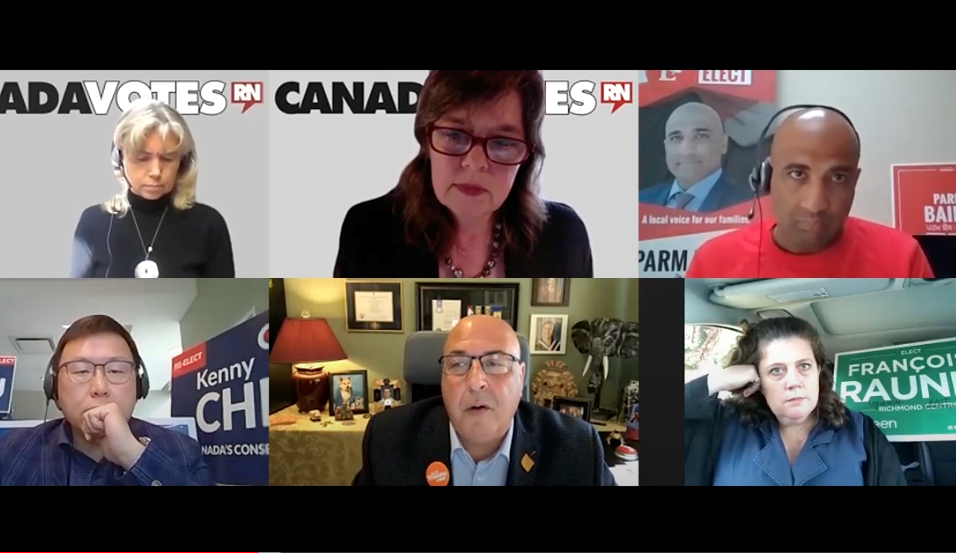Politics sometimes makes for strange bedfellows and this was the case when the NDP and Conservative candidates for Steveston-Richmond East nodded in agreement at an all-candidates meeting that the Liberals haven’t been meeting their commitments to climate change.
After NDP candidate Jack Trovato claimed Canada had the weakest 2030 plan of all G7 countries, saying Canada should be a “leader in green energy and technology,” Chiu said Conservatives are “pragmatic” in their promises.
But Chiu said the NDP and the Conservatives agreed on how they felt about the Liberals’ track record on tackling climate change.
“Jack and I, there is a lot of disagreement between his party and (mine), but with this one, I have to agree whole-heartedly,” Chiu said.
These comments were made during an all-candidates meeting for Steveston-Richmond East candidates, hosted by the Richmond News. (The People’s Party of Canada candidate declined to participate.)
Liberal candidate Parm Bains outlined measures a Liberal government, if re-elected, would enact, for example, phasing out coal and bringing in electric transit.
He claimed his party’s plan was the “most aggressive,” but that change wouldn’t come overnight.
Bains said he’s been hearing from businesses how the Liberal government’s policies have helped them, for example, to procure more sustainable fleets of vehicles.
“This isn’t just ambition, we’re talking about real people making real changes,” Bains said.
He also pointed out the Liberal plan has been supported by Andrew Weaver, former leader of the provincial Green party.
“All of this has been endorsed by a climate scientist who thinks our plan is the best out of all of the other parties,” Bains said. “I’ll let him speak for that. I’m not the climate scientist, he is.”
Green party candidate Francoise Raunet, however, said she wasn’t surprised Weaver endorsed the federal Liberals as he is a “business as usual kind of politician,” wanting to make changes within the existing economic structure.
“But the problem is our current economic structure is fundamentally flawed,” Raunet said. “Because, by pursuing GDP growth and increased consumption, basically what we’re doing is we’re using the planet’s resources at a completely unsustainable rate for the benefit of a very few people.”
Trovato said an NDP government would eliminate fossil-fuel subsidies “once and for all,” and cut emissions by half by investing in clean energy, electric transit as well as retrofitting homes for energy efficiency.
“We need to fight the climate crisis like we want to win it,” Trovato said. “The climate crisis is putting everything that we value at risk.”
Chiu said the Conservatives have a “serious plan” to meet “achievable, realistic targets.”
“Making ambitious promises does not mean you have effective climate policies,” Chiu said.
He said Canada’s emissions, globally, are low, but Canada should work with other countries to reduce emissions.
“We must work with the Chinas, the Indias, the up-and-comers to reduce the climate change effect in the world,” he added.
And while the Steveston-Richmond East candidates agreed climate change needs to be mitigated, albeit differing on how to do so, they also agreed housing has become increasingly unaffordable for most Canadians.
Raunet said the government is currently wasting money on subsidizing the fossil-fuel industry and allowing money to go to overseas tax havens.
Their party has promised to build 300,000 units of “deeply affordable” social housing, she said.
“This is a lot of money that can be channelled out of different current program to pay for housing,” she added.
Raunet pointed out the Lower Mainland isn’t unique with housing unaffordability – citing London, England, as another example – with foreign money inflating prices and making the housing market unaffordable for locals.
There are two economies, she said, one “that serves the rich” and channels money to overseas boardrooms and another where money circulates locally.
“What we need is a government that basically puts an umbrella over our cities and regions and keeps that money flowing locally and prevent it from flowing overseas,” she added.
Bains said the Liberals would create a rent-to-own program as well as ban foreign investment in housing.
“(This) should allow for local investment to take place and give local families, young professionals, working professionals, better opportunities with all the programs that we’re introducing,” he said.
Bains also said there’s a need to increase supply by creating “missing middle options.” He suggested office and industrial space could be converted for housing.
Meanwhile, the Conservatives have said they’ll transform 15 per cent of federal land into residential land.
Chiu said there is surplus federal land holdings, for example, the Department of National Defence land, located just west of the Garden City Lands in Richmond’s city centre, that could be used for housing.
In fact, these lands are located in the Agricultural Land Reserve and can’t be turned into residential without permission from the provincial Agricultural Land Commission.



